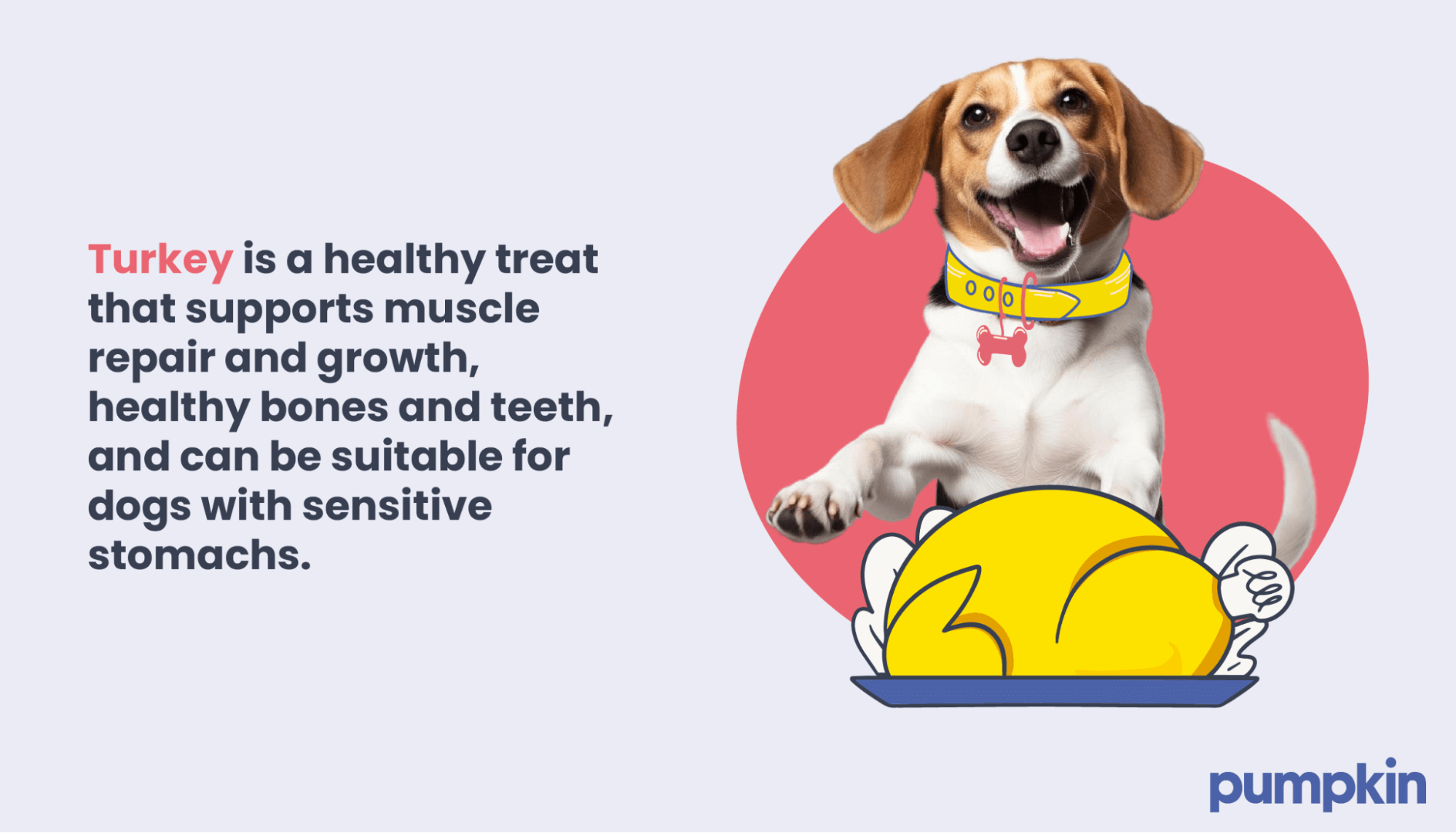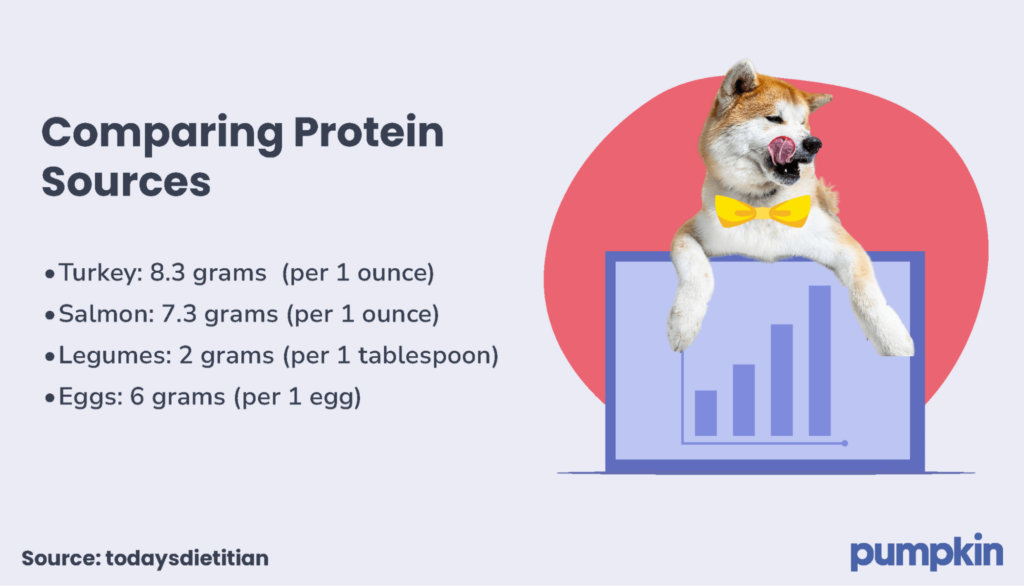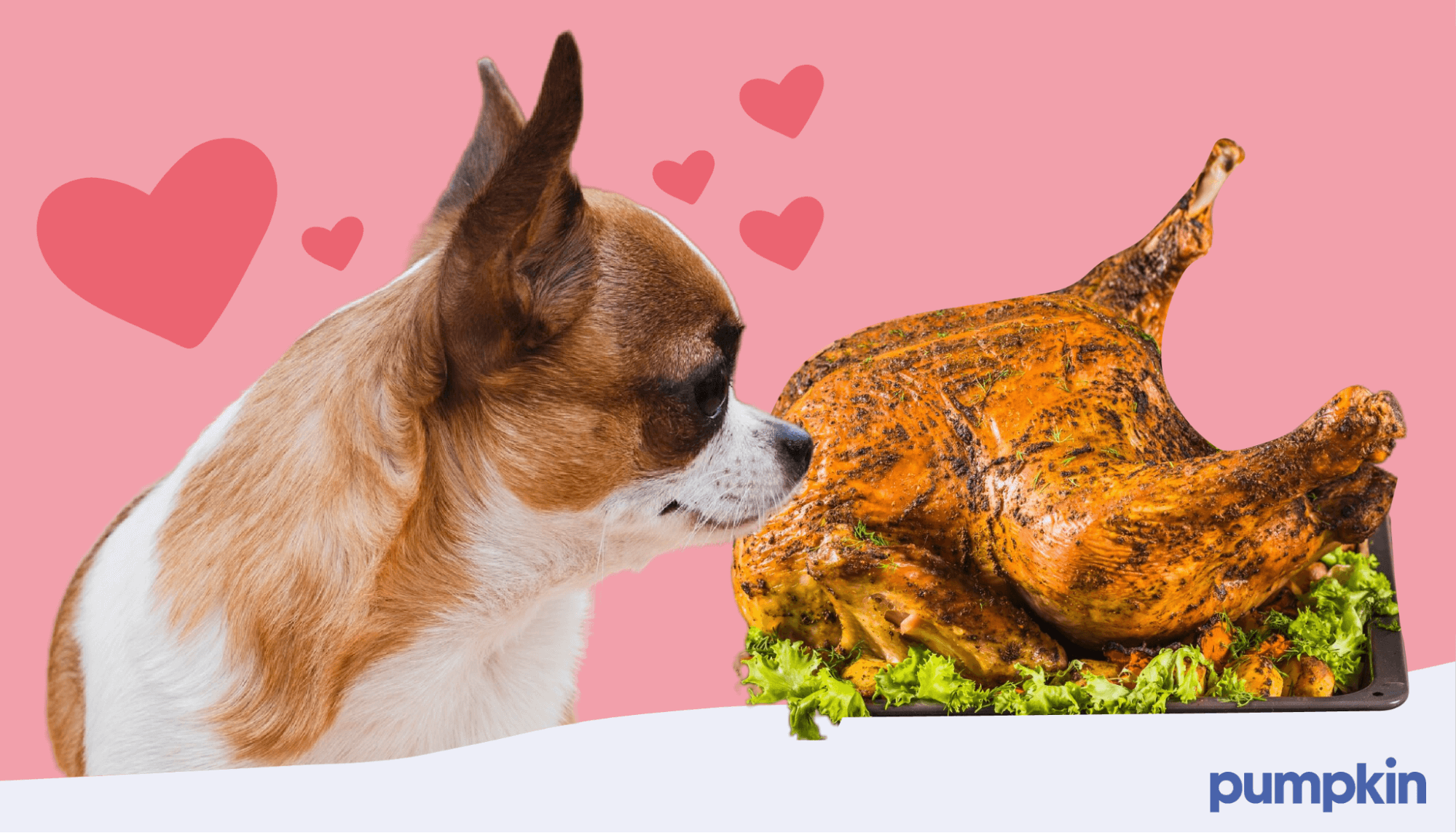Key Points:
- Dogs can eat cooked turkey, but it should be unseasoned and skinless.
- Turkey provides dogs with lean protein, B vitamins, and zinc.
- Raw turkey and turkey bones can be dangerous for dogs.
Whether it’s Thanksgiving dinner, turkey hot dogs for lunch, or fried turkey sausages for breakfast, have you ever noticed how your dog seems to appear out of nowhere when turkey is on the menu?
A lean protein that’s loaded with B vitamins and essential minerals, turkey is definitely healthy for humans, but what about our canine companions? Is turkey safe for our dogs, too?
The quick answer is yes — dogs can eat turkey. In fact, it’s a common ingredient in many commercial dog foods and treats due to its lean, easy-to-digest protein. Turkey can also be an excellent alternative protein for dogs with chicken allergies.
However, not all types of turkey or parts of this tasty poultry are good for dogs. So before sneaking them a bite of your club sandwich, read on to find out everything you need to know about giving your dog turkey.
Health benefits of turkey for dogs
Turkey isn’t just good for dogs. It’s one of the best human foods you can give your pup, period. Packed with essential nutrients, this lean meat supports your dog’s health in so many ways.
Turkey is a fantastic source of high-quality protein — especially breast meat, which is filled with protein that is crucial for muscle growth and repair. This helps keep your dog strong and active.
Turkey is also loaded with vitamins and minerals. It’s rich in phosphorus and vitamin B2 (riboflavin). Phosphorus is vital for healthy bones and teeth, and riboflavin is key for a healthy coat. It’s also rich in niacin (vitamin B3), which plays a vital role in converting nutrients into energy and supporting your dog’s nervous system.

Turkey might become one of your dog’s favorite foods (if it isn’t already), as dogs prefer the taste of meat over grains and veggies. But that doesn’t mean your dog should go on an all-turkey diet. As with any food, moderation and a balanced diet are key.
Risks of feeding turkey to dogs
Proper preparation and serving methods are crucial to ensure your best friend’s safety and health. Here are some key considerations to keep in mind when sharing turkey with your canine friend:
Choking hazards
All poultry contains bones, and turkey bones are a common choking hazard for dogs.
Cooked turkey bones are brittle and can splinter easily, causing choking, mouth injuries, or blockages in the digestive tract. Ingesting splintered bones can also lead to serious internal injuries, such as punctures in the stomach or intestines.
If your dog gobbles up a turkey bone, call your veterinarian for advice. Your vet can take an X-ray to determine if your pup can pass the bone safely or if an expensive surgery will be needed. If your pup has a reputation as a food snatcher, it’s possible you’ve been through this exact ordeal already. A dog insurance plan can ease the financial cost of emergency vet visits in the future, giving anxious pet parents one less thing to worry about.
Dangerous seasonings and additives
Turkey prepared for human consumption often includes harmful seasonings like garlic and onions, both of which are toxic to dogs. Even non-toxic seasonings and additives, such as salt and butter, can cause digestive upset and other health issues in dogs.
High fat content
Turkey skin and some other parts are high in fat, which can lead to pancreatitis in dogs over time, a serious condition causing severe pain and digestive issues. Regular consumption of high-fat foods can also lead to obesity, diabetes, and heart disease in dogs.
Turkey allergies
While rare, some dogs can develop allergies to turkey. Symptoms of a turkey allergy in dogs can include:
- Itchy skin
- Paw biting
- Skin rashes
- Vomiting
It’s important to monitor your dog for any adverse reactions when introducing turkey into their diet.
Contamination
Turkey, particularly raw turkey, can be contaminated with harmful bacteria such as Salmonella and E. coli. These bacteria can cause serious health issues in dogs, including gastrointestinal distress and infection. Proper handling and thorough cooking reduces the risk of contamination and ensures it’s safe to share.
Pet Pro Tip: If you have a dog that is prone to ‘snacksidents’ – you should consider getting a dog insurance plan as soon as possible. It can help you afford the best care in the future by covering eligible vet bills for digestive illnesses, toxic ingestion, and more.
What about raw turkey?
In addition to considering the risks mentioned above, it’s important to safely prepare turkey for your pup. For most pet owners, that means cooking turkey until the interior reaches 165 degrees Fahrenheit.
However, we know that some pet owners do choose to feed raw chicken, turkey, and other meats to their pup, but we recommend talking to your vet before adopting a raw pet food diet.
Plain, cooked, and skinless white meat is the safest, healthiest option for your dog. You can steam it, roast it, grill it, boil it, or bake it. Turkey is also an excellent choice for training treats. Plus, you can use it as a delicious kibble topper if your dog is a picky eater.
No matter how it’s served, remember the 90/10 rule for dog treats. Your dog’s daily calories should be 90% of their regular dog food, while the remaining 10% can come from treats.
Tasty turkey alternatives for dogs
Turkey isn’t the only healthy protein source for your dog.
Here’s a quick look at some of the best alternative protein options, along with their pros and cons:

Fish (salmon) — 7.3 grams of protein (per 1 ounce)
- Pros: Excellent source of protein and omega-3 fatty acids, which promote a healthy coat and skin.
- Cons: Can be more expensive and some dogs might not enjoy the taste.
Eggs — 6 grams of protein (per 1 egg)
- Pros: Highly digestible and packed with essential nutrients.
- Cons: Should be cooked properly to avoid the risk of salmonella.
Plant-based proteins (soy, legumes) — 2 grams of protein (per 1 tablespoon)
- Pros: Good alternative for dogs with meat allergies; contains fiber and vitamins; less expensive.
- Cons: Will not provide complete and balanced amino acids like animal proteins.
Can dogs have turkey? The bottom line
Yes, you can feed your dog cooked, unseasoned, and skinless turkey. However, avoid turkey skin and bones to prevent digestive issues and potential injuries. Always monitor portion sizes to keep your dog healthy.
If you have any questions when introducing new foods to your dog’s diet, you can consult with your veterinarian to ensure it fits your dog’s specific dietary needs.
- https://www.ncbi.nlm.nih.gov/pmc/articles/PMC11082980/
- https://www.ncbi.nlm.nih.gov/pmc/articles/PMC8100497/
- https://www.ncbi.nlm.nih.gov/pmc/articles/PMC7355824/
- https://fdc.nal.usda.gov/fdc-app.html#/food-details/171098/nutrients
- https://ods.od.nih.gov/factsheets/Niacin-HealthProfessional/
- https://www.ncbi.nlm.nih.gov/pmc/articles/PMC1789883/
- https://www.ncbi.nlm.nih.gov/pmc/articles/PMC2984110/
- https://www.feltonveterinaryhospital.com/blog/pancreatitis-in-dogs-talking-turkey/
- https://www.modernherbshop.com/articles.asp?id=129
- https://vcacanada.com/know-your-pet/food-allergies-in-dogs
- https://www.ncbi.nlm.nih.gov/pmc/articles/PMC7152306/
- https://www.aaha.org/wp-content/uploads/globalassets/05-pet-health-resources/nutritionalresources/hills-resources/hills-nutritional-reference-manual.pdf
- https://www.todaysdietitian.com/pdf/webinars/ProteinContentofFoods.pdf
- https://www.fda.gov/food/buy-store-serve-safe-food/safe-food-handling




